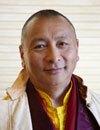
Our basic nature—our basic being—is absolutely perfect. It is identical to the basic being or basic nature of buddhas. No distinction whatsoever can be made between the buddha nature of a sentient being and the buddha nature of a buddha. It is not the case that the buddha nature of buddhas is greater or more than the buddha nature of sentient beings, nor that the buddha nature of buddhas is somehow better or purer that the buddha nature of beings. The only distinction between buddhas and sentient beings is that in the case of a buddha this nature is unconcealed or unveiled, and in the case of sentient beings like ourselves it is temporarily veiled or obscured. Therefore it is said that although all beings possess buddha nature, it is however veiled by temporary obscurations. These obscurations are called temporary because they are not intrinsic to the nature itself, they can therefore be removed, but they will only be removed under the conditions that remove them. What do these obscurations fundamentally consist of? They consist of our persistent belief in a self. There is no such thing, has never been such a thing, and could never be such a thing as a self. It is actually impossible, yet we continue to believe in a self.
In the Uttaratantra Shastra Maitreya said, “Because the buddhakaya is all-pervasive, because there is no difference within that, and because all beings demonstrate the potential, it is said that all beings possess buddha nature.” Here Matireya sets forth three arguments for the existence of buddha nature. The first argument is that the buddhakaya is all-pervasive. Kaya means body, in this case buddhakaya or buddha body refers to the dharmakaya, the actual state of buddhahood itself. His argument is that since the actual nature of buddhahood is the dharmakaya, and since the dharmakaya is emptiness, and since emptiness is the nature of each and every being, it is therefore certain that each and every being possesses buddha nature.
If it were possible for a being to exist and have a mind that did not have the nature of the dharmakaya, then it would be possible that that being could not achieve buddhahood, but this is not the case. Emptiness is the nature of all of samsara and all of nirvana. There is nothing outside or beyond this nature. Therefore the dharmakaya is the nature of the mind of any being, and therefore all beings are naturally capable of awakening.
His second argument is that there is no difference or distinction within that. By “that” he means the nature of all things, the dharmakaya itself. There is no difference within buddha nature in the sense that the buddha nature of anyone being or buddha is in all ways equal to the buddha nature of any other being or buddha. Buddhas’ buddha nature is not greater than or better than the buddha nature of sentient beings. So his second argument is that the basic nature of each and every being is equally the dharmakaya. Not only is the dharmakaya the nature of every being but it is equally the nature of every being.
His third argument is that beings demonstrate potential. All beings demonstrate, in one way or another, the potential for awakening. Because of the specific karmic history and varied obscurations that beings have picked up, we demonstrate various potentials. Matireya speaks of five. He calls them the shravaka potential, the pratyeka potential, the mahayana or bodhisattva potential, the uncertain potential, and the isolated potential. But each and every being, even the worst of us, has one of these. The shravaka potential is possessed by a being who is naturally disposed to the shravakayana path, the pratyekayana buddha potential is that which is exhibited by a being who is naturally disposed toward that path, the mahayana or bodhisattva potential is exhibited by a being who is naturally disposed to that path, the uncertain potential is what is exhibited by a being who is easily influenced and will adopt the type of spirituality that they are primarily exposed to, and the isolated potential is what is exhibited by those beings we normally think of as irreparably bad. We can all think of people who, when we say everyone has buddha nature, we think might be exceptions to it; famous people such as Adolph HItler or Mao Tse Tung, or the various devils or demons who are set up as embodiments of pure evil in the various world religions. But according to the Buddha, even the worst of us possesses full buddha nature. In the case of the worst of us, what has happened is that because of our lack of merit, which is temporary, we are engaged in extensive wrongdoing and we have isolated ourselves from our own buddha nature. But even when someone is isolated from their own buddha nature, this is temporary. It simply means that you are very obscured, but this isolation is not permanent because it is not intrinsic to buddha nature itself. Even while one is in the worst possible state, one still possesses buddha nature, one always does, and this means therefore that as soon as one changes one’s course of action, one will move in a different direction, and definitely become capable of achieving buddhahood. So the only difference between these five potentials, or within them, is how close or far the individual is to access their own buddha nature. But the buddha nature within them is equally present. Therefore Maitreya’s third argument is that because all beings exhibit one or another of these potentials, they are all capable of buddhahood.
[From a teaching on Buddha Nature by Bardor Tulku Rinpoche given in Tampa Bay, Florida, in February 2009. Translated by Lama Yeshe Gyamtso, transcribed by Ann G. Shaffer, copy-edited by Basia Coulter. Copyright 2009 Bardor Tulku Rinpoche and Peter O’Hearn. All rights reserved.]
